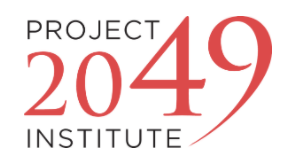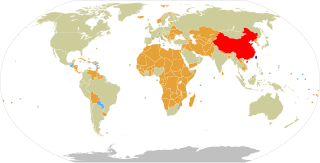
Foreign relations of the Republic of China (ROC), more commonly known as Taiwan, are accomplished by efforts of the Ministry of Foreign Affairs of the Republic of China, a cabinet-level ministry of the Government of the Republic of China. As of January 2024, the ROC has formal diplomatic relations with 11 of the 193 United Nations member states and with the Holy See, which governs the Vatican City State. In addition to these relations, the ROC also maintains unofficial relations with 59 UN member states, one self-declared state (Somaliland), three territories (Guam, Hong Kong, and Macau), and the European Union via its representative offices and consulates. In 2021, the Government of the Republic of China had the 33rd largest diplomatic network in the world with 110 offices.
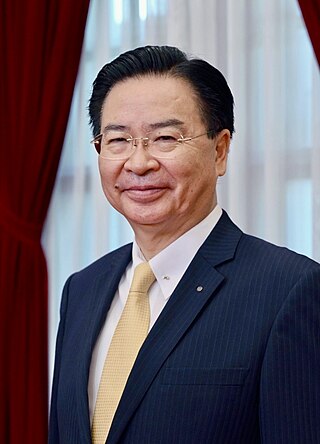
Joseph Wu Jaushieh is a Taiwanese politician currently serving as the Minister of Foreign Affairs of the Taiwan (ROC) under former President Tsai Ing-wen and current President William Lai since February 26, 2018. He was formerly the Secretary-General to the President of Taiwan and the Secretary-General of the National Security Council of Taiwan. From 2007 to 2008, he was Chief Representative of Taiwan to the United States as the head of the Taipei Economic and Cultural Representative Office in Washington, D.C., having been appointed to that position by President Chen Shui-bian to succeed his predecessor, David Lee. On February 26, 2018, he succeeded Lee as the Minister of Foreign Affairs.
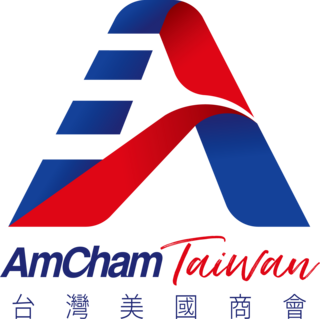
The American Chamber of Commerce in Taiwan is an international business association based in Taipei City, Taiwan, with about 1,100 members representing over 580 companies across various sectors.

Cross-strait relations are the political and economic relations between mainland China and Taiwan across the Taiwan Strait. Due to the existing controversy over the status of Taiwan, they are also not defined as diplomatic relations by both sides.

Tsai Ing-wen is a Taiwanese politician who served as the 7th president of the Republic of China (Taiwan) from 2016 to 2024, and was the first woman to hold that position. A member of the Democratic Progressive Party (DPP), she intermittently served as chair of the DPP from 2008 to 2012, 2014 to 2018, and 2020 to 2022.

The United States foreign policy toward the People's Republic of China originated during the Cold War. At that time, the U.S. had a containment policy against communist states. The leaked Pentagon Papers indicated the efforts by the U.S. to contain China through military actions undertaken in the Vietnam War. The containment policy centered around an island chain strategy. President Richard Nixon's China rapprochement signaled a shift in focus to gain leverage in containing the Soviet Union. Formal diplomatic ties between the U.S. and China were established in 1979, and with normalized trade relations since 2000, the U.S. and China have been linked by closer economic ties and more cordial relations. In his first term as U.S. president, Barack Obama said, "We want China to succeed and prosper. It's good for the United States if China continues on the path of development that it's on".

The Center for a New American Security (CNAS) is a think tank in Washington, D.C. specializing in United States national security issues, including terrorism, irregular warfare, the future of the U.S. military, the emergence of Asia as a global power center, war games pitting the U.S. against the People's Republic of China, and the national security implications of natural resource consumption, among others.

South Korean–Taiwan relations

Oceania is, to the People's Republic of China and the Republic of China, a stage for continuous diplomatic competition. The PRC dictates that no state can have diplomatic relations with both the PRC and the ROC. As of 2024, eleven states in Oceania have diplomatic relations with the PRC, and three have diplomatic relations with the ROC. These numbers fluctuate as Pacific Island nations re-evaluate their foreign policies, and occasionally shift diplomatic recognition between Beijing and Taipei. The issue of which "Chinese" government to recognize has become a central theme in the elections of numerous Pacific island nations, and has led to several votes of no-confidence.

After the United States established diplomatic relations with the People's Republic of China (PRC) in 1979 and recognized Beijing as the only legal government of China, Taiwan–United States relations became unofficial and informal following terms of the Taiwan Relations Act (TRA), which allows the United States to have relations with the Taiwanese people and their government, whose name is not specified. U.S.–Taiwan relations were further informally grounded in the Six Assurances in response to the third communiqué on the establishment of US–PRC relations. The Taiwan Travel Act, passed by the U.S. Congress on March 16, 2018, allows high-level U.S. officials to visit Taiwan and vice versa. Both sides have since signed a consular agreement formalizing their existent consular relations on September 13, 2019. The US government removed self-imposed restrictions on executive branch contacts with Taiwan on January 9, 2021.
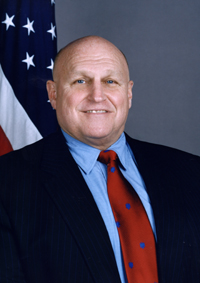
Richard Lee Armitage is an American former diplomat and government official. A graduate of the United States Naval Academy, Armitage served as a U.S. Navy officer in three combat tours of duty in the Vietnam War as a riverine warfare advisor. After leaving active duty, he served in a number of civil-service roles under Republican administrations. He worked as an aide to Senator Bob Dole before serving in various posts in the Defense Department and State Department.
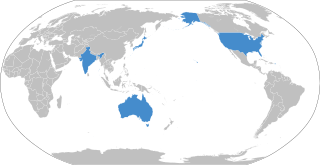
The Quad is a grouping of Australia, India, Japan, and the United States that is maintained by talks between member countries. The grouping was initiated in 2007 by Japanese Prime Minister Shinzo Abe, with the support of Australian Prime Minister John Howard, Indian Prime Minister Manmohan Singh and U.S. Vice President Dick Cheney. The dialogue was paralleled by joint military exercises of an unprecedented scale, titled Exercise Malabar. The diplomatic and military arrangement was widely viewed as a response to increased Chinese economic and military power.
John Ernest "Jack" Randall was an American ichthyologist and a leading authority on coral reef fishes. Randall described over 800 species and authored 11 books and over 900 scientific papers and popular articles. He spent most of his career working in Hawaii. He died in April 2020 at the age of 95.

Feng Shih-kuan is a Taiwanese politician. He served in the Republic of China Air Force from 1967 to 2006, retiring with the rank of General before assuming the post of Minister of National Defense in 2016. Feng stepped down in 2018 and was succeeded by Yen Teh-fa.

The New Southbound Policy is an initiative of the Taiwanese government under President Tsai Ing-wen that aims to enhance cooperation and exchange between Taiwan and 18 countries in Southeast Asia, South Asia and Australasia.

Randall G. Schriver, also known as Randy Schriver, is the Chairman of the Project 2049 Institute, and previously served as Assistant Secretary of Defense for Indo-Pacific Security Affairs in the United States government. He concurrently holds positions as a Commissioner on the United States–China Economic and Security Review Commission, and a partner at Pacific Solutions. Previously, Schriver served as Deputy Assistant Secretary of State for East Asian and Pacific Affairs and was a founding partner of Armitage International.
Prospect Foundation, is a government-affiliated think tank based in Taiwan, established in 1997, which aims to analyze the Cross-Taiwan-Strait relations and international politics and economy and provide suggestions of policies for Taiwan government. There are about a dozen of research fellows in Prospect Foundation who research and analyze the development of Cross-Strait relations and international developments.

The Taiwan People's Party (TPP) is a centre-left political party in Taiwan. It was formally established on 6 August 2019 by Ko Wen-je, who serves as its first and current chairman. The party considers itself as an alternative third party to both the Democratic Progressive Party and Kuomintang.

The Taiwan Allies International Protection and Enhancement Initiative (TAIPEI) Act of 2019 is an Act of the United States Congress. It aims to increase the scope of US relations with Taiwan and encourage other nations and international organizations to strengthen their official and unofficial ties with the island nation.

Tsai Ming-yen is a Taiwanese diplomat and academic who currently serves as the director-general of the National Security Bureau.
